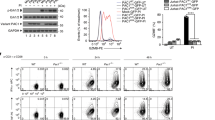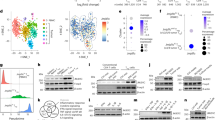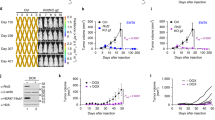Abstract
Forkhead box P3 (Foxp3)+ T regulatory (Treg) cells maintain immune homeostasis and limit autoimmunity but can also curtail host immune responses to various types of tumors1,2. Foxp3+ Treg cells are therefore considered promising targets to enhance antitumor immunity, and approaches for their therapeutic modulation are being developed. However, although studies showing that experimentally depleting Foxp3+ Treg cells can enhance antitumor responses provide proof of principle, these studies lack clear translational potential and have various shortcomings. Histone/protein acetyltransferases (HATs) promote chromatin accessibility, gene transcription and the function of multiple transcription factors and nonhistone proteins3,4. We now report that conditional deletion or pharmacologic inhibition of one HAT, p300 (also known as Ep300 or KAT3B), in Foxp3+ Treg cells increased T cell receptor–induced apoptosis in Treg cells, impaired Treg cell suppressive function and peripheral Treg cell induction, and limited tumor growth in immunocompetent but not in immunodeficient mice. Our data thereby demonstrate that p300 is important for Foxp3+ Treg cell function and homeostasis in vivo and in vitro, and identify mechanisms by which appropriate small-molecule inhibitors can diminish Treg cell function without overtly impairing T effector cell responses or inducing autoimmunity. Collectively, these data suggest a new approach for cancer immunotherapy.
This is a preview of subscription content, access via your institution
Access options
Subscribe to this journal
Receive 12 print issues and online access
$209.00 per year
only $17.42 per issue
Buy this article
- Purchase on Springer Link
- Instant access to full article PDF
Prices may be subject to local taxes which are calculated during checkout




Similar content being viewed by others
Accession codes
References
Zou, W. Regulatory T cells, tumour immunity and immunotherapy. Nat. Rev. Immunol. 6, 295–307 (2006).
Nishikawa, H. & Sakaguchi, S. Regulatory T cells in tumor immunity. Int. J. Cancer 127, 759–767 (2010).
van Loosdregt, J. et al. Regulation of Treg functionality by acetylation-mediated Foxp3 protein stabilization. Blood 115, 965–974 (2010).
Liu, Y., Wang, L., Han, R., Beier, U.H. & Hancock, W.W. Two lysines in the forkhead domain of foxp3 are key to T regulatory cell function. PLoS ONE 7, e29035 (2012).
Dranoff, G. CTLA-4 blockade: unveiling immune regulation. J. Clin. Oncol. 23, 662–664 (2005).
Powell, D.J. Jr. et al. Administration of a CD25-directed immunotoxin, LMB-2, to patients with metastatic melanoma induces a selective partial reduction in regulatory T cells in vivo. J. Immunol. 179, 4919–4928 (2007).
Fietta, A.M. et al. Systemic inflammatory response and downmodulation of peripheral CD25+Foxp3+ T-regulatory cells in patients undergoing radiofrequency thermal ablation for lung cancer. Hum. Immunol. 70, 477–486 (2009).
Wang, L., de Zoeten, E.F., Greene, M.I. & Hancock, W.W. Immunomodulatory effects of deacetylase inhibitors: therapeutic targeting of FOXP3+ regulatory T cells. Nat. Rev. Drug Discov. 8, 969–981 (2009).
Tao, R. et al. Deacetylase inhibition promotes the generation and function of regulatory T cells. Nat. Med. 13, 1299–1307 (2007).
de Zoeten, E.F. et al. Histone deacetylase 6 and heat shock protein 90 control the functions of Foxp3+ T-regulatory cells. Mol. Cell Biol. 31, 2066–2078 (2011).
Beier, U.H. et al. Sirtuin-1 targeting promotes Foxp3+ T-regulatory cell function and prolongs allograft survival. Mol. Cell Biol. 31, 1022–1029 (2011).
Beier, U.H. et al. Histone deacetylases 6 and 9 and sirtuin-1 control foxp3+ regulatory T cell function through shared and isoform-specific mechanisms. Sci. Signal. 5, ra45 (2012).
Roth, S.Y., Denu, J.M. & Allis, C.D. Histone acetyltransferases. Annu. Rev. Biochem. 70, 81–120 (2001).
Rudra, D. et al. Runx-CBFβ complexes control expression of the transcription factor Foxp3 in regulatory T cells. Nat. Immunol. 10, 1170–1177 (2009).
Chaudhry, A. et al. CD4+ regulatory T cells control TH17 responses in a Stat3-dependent manner. Science 326, 986–991 (2009).
Chaudhry, A. et al. Interleukin-10 signaling in regulatory T cells is required for suppression of TH17 cell–mediated inflammation. Immunity 34, 566–578 (2011).
Lee, I. et al. Recruitment of Foxp3+ T regulatory cells mediating allograft tolerance depends on the CCR4 chemokine receptor. J. Exp. Med. 201, 1037–1044 (2005).
Huehn, J. et al. Developmental stage, phenotype, and migration distinguish naive- and effector/memory-like CD4+ regulatory T cells. J. Exp. Med. 199, 303–313 (2004).
Anz, D. et al. CD103 is a hallmark of tumor-infiltrating regulatory T cells. Int. J. Cancer 129, 2417–2426 (2011).
Bowers, E.M. et al. Virtual ligand screening of the p300/CBP histone acetyltransferase: Identification of a selective small molecule inhibitor. Chem. Biol. 17, 471–482 (2010).
Chen, W. et al. Conversion of peripheral CD4+CD25− naive T cells to CD4+CD25+ regulatory T cells by TGF-β induction of transcription factor Foxp3. J. Exp. Med. 198, 1875–1886 (2003).
Tone, Y. et al. Smad3 and NFAT cooperate to induce Foxp3 expression through its enhancer. Nat. Immunol. 9, 194–202 (2008).
Ye, Q. et al. BAFF binding to T cell-expressed BAFF-R costimulates T cell proliferation and alloresponses. Eur. J. Immunol. 34, 2750–2759 (2004).
Lau, O.D. et al. HATs off: selective synthetic inhibitors of the histone acetyltransferases p300 and PCAF. Mol. Cell 5, 589–595 (2000).
Zhou, G. & Levitsky, H.I. Natural regulatory T cells and de novo-induced regulatory T cells contribute independently to tumor-specific tolerance. J. Immunol. 178, 2155–2162 (2007).
Hanahan, D. & Weinberg, R.A. Hallmarks of cancer: the next generation. Cell 144, 646–674 (2011).
Kasper, L.H. et al. Conditional knockout mice reveal distinct functions for the global transcriptional coactivators CBP and p300 in T cell development. Mol. Cell Biol. 26, 789–809 (2006).
Rubtsov, Y.P. et al. Regulatory T cell–derived interleukin-10 limits inflammation at environmental interfaces. Immunity 28, 546–558 (2008).
Battke, F., Symons, S. & Nieselt, K. Mayday—integrative analytics for expression data. BMC Bioinformatics 11, 121 (2010).
Lin, K.Y. et al. Treatment of established tumors with a novel vaccine that enhances major histocompatibility class II presentation of tumor antigen. Cancer Res. 56, 21–26 (1996).
Jackaman, C. et al. IL-2 intratumoral immunotherapy enhances CD8+ T cells that mediate destruction of tumor cells and tumor-associated vasculature: a novel mechanism for IL-2. J. Immunol. 171, 5051–5063 (2003).
Haas, A.R. et al. Cycloxygenase-2 inhibition augments the efficacy of a cancer vaccine. Clin. Cancer Res. 12, 214–222 (2006).
Acknowledgements
We thank E. Verdin (Gladstone Institute of Virology and Immunology, University of California–San Francisco) for antibody to acetylated Foxp3; X.-J. Yang (Department of Medicine, McGill University) for p300 expression vector; Y. Paterson (Department of Microbiology, University of Pennsylvania) for TC1 cell lines; and D. Nelson (Department of Medicine, University of Western Australia) for the AE17.OVA mesothelioma cell line. This work was supported by grants from the US National Institutes of Health (K08AI095353 to U.H.B. and P01AI073489 and 1R01CA158941 to W.W.H.).
Author information
Authors and Affiliations
Contributions
Y.L. and L.W. performed most studies, analyzed data and edited the manuscript. Y.L. wrote the manuscript. J.P., L.-C.S.W., V.K., S.S. and S.M.A. performed tumor studies and analyzed tumor data. R.H. undertook mouse breeding and performed histology. U.H.B. analyzed microarray data, analyzed data and edited the manuscript. T.R.B. performed histology. T.A. performed autoantibody screening, analyzed data and edited the manuscript. P.K.B. and P.A.C. provided unique mice and reagents, respectively, and analyzed data. W.W.H. designed and directed this study, analyzed data and edited the manuscript.
Corresponding author
Ethics declarations
Competing interests
The authors declare no competing financial interests.
Supplementary information
Supplementary Text and Figures
Supplementary Figures 1–8 and Supplementary Tables 1 and 2 (PDF 18084 kb)
Rights and permissions
About this article
Cite this article
Liu, Y., Wang, L., Predina, J. et al. Inhibition of p300 impairs Foxp3+ T regulatory cell function and promotes antitumor immunity. Nat Med 19, 1173–1177 (2013). https://doi.org/10.1038/nm.3286
Received:
Accepted:
Published:
Issue Date:
DOI: https://doi.org/10.1038/nm.3286
This article is cited by
-
Obesity, but not high-fat diet, is associated with bone loss that is reversed via CD4+CD25+Foxp3+ Tregs-mediated gut microbiome of non-obese mice
npj Science of Food (2023)
-
The absence of AhR in CD4+ T cells in patients with acute graft-versus-host disease may be related to insufficient CTCF expression
Clinical Epigenetics (2022)
-
Bioinformatics methods in biomarkers of preeclampsia and associated potential drug applications
BMC Genomics (2022)
-
Dysregulated lncRNA and mRNA may promote the progression of ischemic stroke via immune and inflammatory pathways: results from RNA sequencing and bioinformatics analysis
Genes & Genomics (2022)
-
Activation of AMPKα1 is essential for regulatory T cell function and autoimmune liver disease prevention
Cellular & Molecular Immunology (2021)



